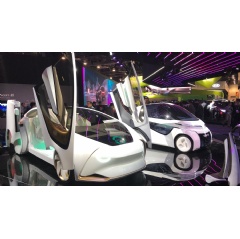Feedback on CES 2018
To discover the latest innovations and most promising trends, BNP Paribas traveled to Las Vegas for the Consumer Electronics Show (CES), the renowned annual tech industry meeting. Here’s a look at the future that awaits you.
CES Today
Launched more than 50 years ago, CES is the largest public technology event in the world. Offering a window onto the latest technological innovations, the event is held annually in Las Vegas, where startups and major companies alike come together to discuss new trends and draw inspiration. Xavier Chanel, Digital Project Manager at BNP Paribas, went to explore the show on behalf of the Group, and to discover the most promising consumer goods and cutting-edge technologies. His goal was to find the raw material necessary to further enrich BNP Paribas’ offering. At this year’s event, artificial intelligence, voice commands, 5G, and augmented reality stole the spotlight. From press conferences to product presentations, Xavier Chanel takes stock of the most significant events from CES 2018.
When Artificial Intelligence (AI) helps us with complex tasksAI was omnipresent at CES this year, as the technology moves closer to touching the lives of every person on Earth. For IT giant Cisco, AI “is destined to increase human power”. Some of Cisco’s tools can already detect malware from encrypted network flows, and even help developers code. The idea is to facilitate creation and daily management of computer science developments.
Google and IBM, for their part, envisage an AI capable of replacing humans and making decisions on its own—in the service, of course, of humans. Within five to 10 years, the players in this sector hope to create a super intelligence capable of solving complex problems with myriad options, understanding context, and proposing coherent solutions within given parameters. AI has even started to code autonomously!
When the autonomous car frees up money for the houseFor families in the United States, a car is one of the largest and most significant investment they make, second only to a house. With the age of autonomous vehicles now upon us, everything is about to change. We will no longer buy a car, but buy routes or rides, instead. So what will become of the estimated $40,000 to $50,000 in extra cash families will save by not owning a car? Manufacturers propose re-allocating it toward household equipment—advanced cleaning robots, capable of wiping away even the most difficult stains, AI-powered home automation, or various voice assistants.
When the smartphone offers its services to connected healthFor Samsung, the near future is on a plate. In 2023, consumers will be able to photograph each of their meals and have their smartphones calculate the number of calories they’re about to consume. Their phones will also propose personalized exercises, which will be monitored by a connected watch. When users get back from their workout, their refrigerator will suggest several menus catered to their dietary needs, using any food that’s available and not expired. Once their meals have been chosen, the device will send cooking instructions directly to their oven, and a televisual or vocal assistant will offer advice on how to follow the recipe.
When emotional intelligence lifts our spiritsAn emerging component of AI, emotional intelligence identifies human feeings in order to maintain or perhaps change them. For example, a person returns home and his cameras notice that he is sad. His favorite entertainment services (music streaming, VOD) will then offer a selection of content that might cheer him up.
When a voice becomes our best assistantIn the US, an estimated 50% of internet searches will be conducted vocally by 2020. Consequently, the use of vocal bots, or automated talking assistants, is projected to increase across all sectors over the coming years.
When grocery shopping becomes as simple as taking a walkFor major distributors, progress in this area is already advancing quickly. Amazon made a splash in 2017 with the launch of Amazon Go—checkout-less supermarkets that allow consumers to buy groceries by scanning their smartphones at gates located at every entrance. In China, retail sales leader Suning aims to go even further: its clients will now be identified using facial recognition. They will enter and leave freely with their groceries, their purchases will be identified, and the payment will be automatic. It’s a simple concept, yet one that makes it impossible for consumers to change their minds at the last moment, when they realize how much they have spent on their shopping.
( Press Release Image: https://photos.webwire.com/prmedia/6/221389/221389-1.jpg )
WebWireID221389
This news content was configured by WebWire editorial staff. Linking is permitted.
News Release Distribution and Press Release Distribution Services Provided by WebWire.
